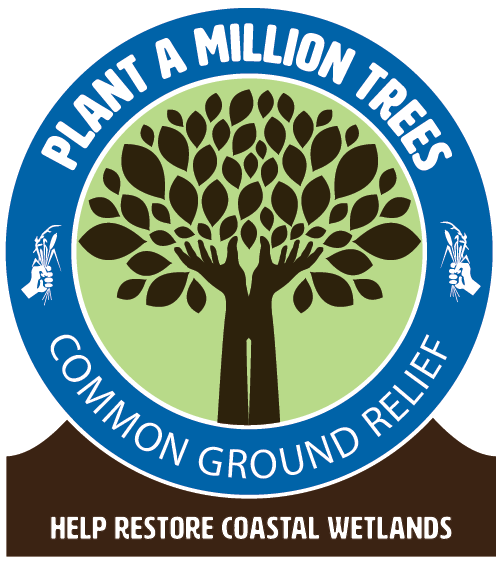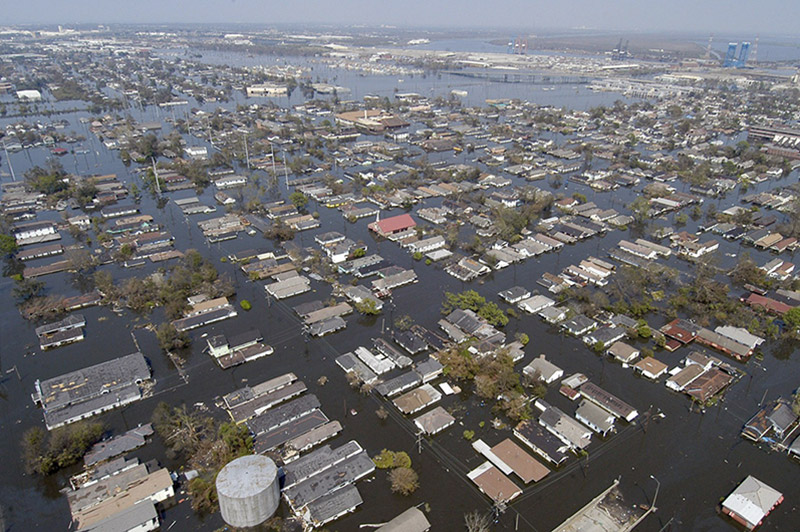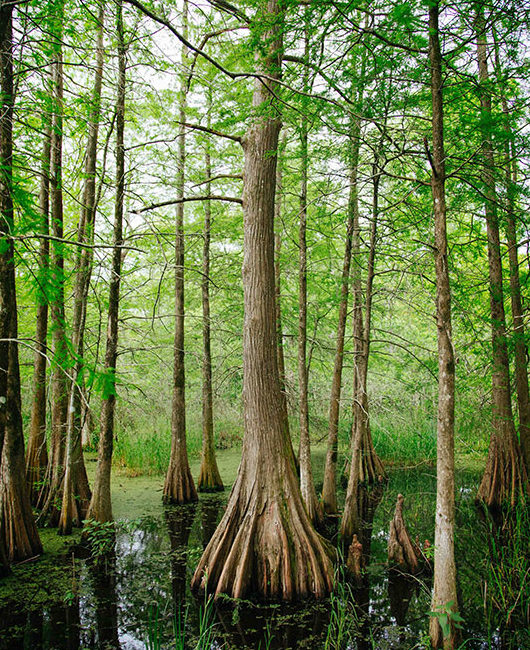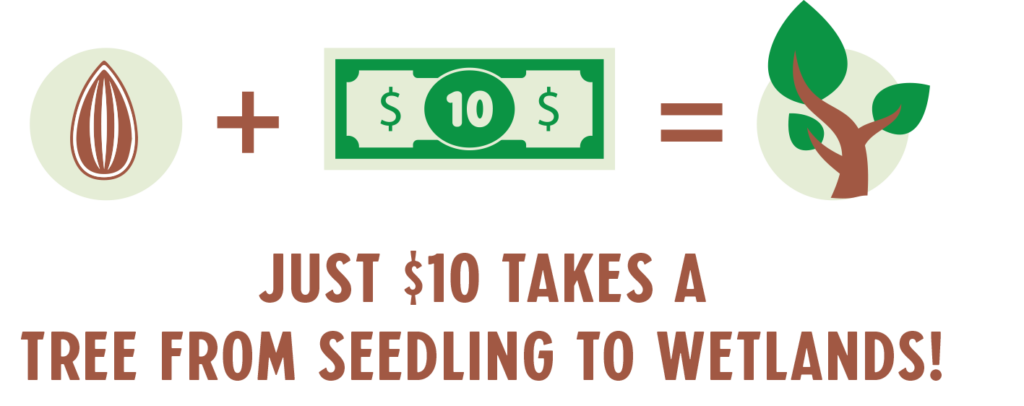
As you read this, Louisiana’s wetlands are vanishing
This coastal land loss is one of the most serious environmental crises today, threatening people, wildlife, and the economy in New Orleans, the state of Louisiana, and across the country.

Within Louisiana, coastal wetlands help reduce flooding and erosion, provide essential habitat for wildlife, and support significant economic and recreational functions. Throughout the country, they sustain commercial fishing, protect important shipping ports, and support the nation’s energy supplies.
- Due to natural causes and human interventions, Louisiana lost 1.2 million acres (2,000 square miles) of coastal land from 1932 to 2010.
- In 2015, we lost 350 million trees In Hurricane Katrina and Rita.

- Every hour, a wetlands area, the size of a football field, vanishes into the Gulf of Mexico.
- Every year, an average of 10,000 acres of land vanishes into open waters.
- In the next five decades, with land subsidence and climate change related sea level rise and storm increases, the Louisiana coast is expected to lose another 1,800 square miles.
Restoring Louisiana’s coastal wetlands is a collective imperative
It requires immediate and on-going efforts of individuals, communities, organizations, and businesses, as well as the local, state, and federal government.
Or mail a donation to:
Common Ground Relief
1800 Deslonde Street
New Orleans, LA 70117
You can make a difference by joining with Common Ground Relief to create a more resilient coast.
Our Goal
Plant a Million Trees
At Common Ground Relief, we believe that localized landscape-scale plantings restart the natural process of regeneration, address issues of sustainability, and foster greater community resiliency. Our approach leverages the passion and knowledge of the community, the enthusiasm and energy of volunteers who come from across the globe, as well as the expertise our committed staff and partners.
Our goal is to plant 1,000,000 trees. When we reach that goal, we will plant another 1,000,000, and then another until we replace the trees that we lost.
Join us in the battle to build healthy, robust coastal wetlands by contributing to the Plant a Million Trees Campaign.
$10 takes a tree from seedling to wetlands!
One mature Bald Cypress has a canopy of 225 square feet.
$2,000 reforests an entire acre with Bald Cypress!
It takes 193 Bald Cypress to reforest 1 acre of land.

From New Orleans to the Northshore to the mouth of the Mississippi
Common Ground Relief has developed an effective and cost-efficient model that allows us to take a tree from a seedling to the wetlands for just $10. This includes:
- Growing trees at our own nursery in New Orleans Lower Ninth Ward, engaging local students and volunteers from across the world, we keep our cost-per-tree planted low.
- Working with Southeast Louisiana communities to build and manage local, community-based tree nurseries. Common Ground Relief is also providing local trainings to teach proper growing and planting techniques. This will provide more native trees, allow on-going, regular plantings, and build greater resiliency as communities start to mitigate and prepare for climate change realities.
- Common Ground Relief plants throughout Southeast Louisiana. Why? Because we are all part of the Mississippi Delta Watershed. Healthy wetlands at the mouth of the Mississippi River and along the coasts of Lake Pontchartrain are the first defense against flooding, as well as providing a robust ecosystem for commercial and recreational activities. It is also important to plant native trees, grasses, and flowers in New Orleans urban areas. These plants will absorb flood waters and storm runoff, as well as provide wildlife habitat, shade, and other positive benefits.
- Over the years, Common Ground Relief has provided native trees and grasses, as well as volunteer support to local organizations including the Lake Pontchartrain Basin Foundation and the Coalition to Restore to Coastal Louisiana. We support the education efforts of GroundworkNOLA and we support the advocacy efforts of Restore the Mississippi River Delta and America’s WETLAND Foundation. We also support the urban reforestation efforts of SOUL and the NOLA Tree Project. These relationships have amplified the impact of our nursery and volunteer model.
Our volunteers have planted native trees and grasses in:
- City Park
- Audubon Louisiana Nature Center
- Bayou Bienvenue Wetlands Triangle
- Bonnet Carre’ Spillway
- Bayou Sauvage National Wildlife Refuge
- Big Branch National Wildlife Refuge
- Pass a Loutre Wildlife Management Area
- Grande Isle State Park
- Beauregard Island
Our One Million Tree Campaign will build upon these past efforts, and working together, we will protect and restore the most diverse and productive ecosystem in the nation.
Everyone has a role to play in preserving the richness of Louisiana’s coast! With your support, we can achieve the goal of planting a million trees!
Or mail a donation to:
Common Ground Relief
1800 Deslonde Street
New Orleans, LA 70117
How Trees Help

Protect against storm surge
One acre of wetlands has the capacity to hold up to 1 million gallons of water during a flood! On average, damaging storm surges are reduced by one foot for every 2.7 miles of wetlands, reducing wave energy and protecting levees and other critical infrastructure from these destructive forces of nature.

Rebuild wildlife habitat and nurseries
Songbirds, wading birds, waterfowl, raptors, reptiles, amphibians, mammals, crawfish, and fish are common permanent or seasonal inhabitants of Louisiana’s coastal forests. The Coastal Reforestation Campaign will be providing land mass on which local and migratory birds can rest and nest as well as enhancing water quality for critical spawning and nursery habitat.

Support economic and recreational activity
Nourished maritime forests provide the basic environmental, economic, and recreational functions that contribute to individual and community resilience in Southeast Louisiana. Wetland habitats support important commercial and recreational activities, such as sport fishing, waterfowl and big and small game hunting, shrimping, crabbing and crawfishing. Marshes also support many non-consumptive recreational uses such as camping, wildlife observation, and ecotourism.

Address Climate Change
Sequestering carbon is another major environmental benefit of bottomland, hardwood trees. In coastal Louisiana, Cypress-tupelo forests and freshwater marshes enhances carbon sequestration and avoids carbon releases that occur as wetlands convert to open water.

